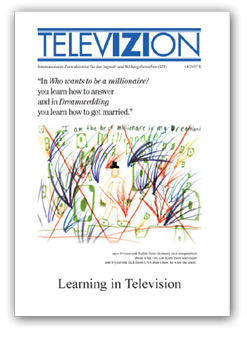|
 >> Overview TelevIZIon >> Overview TelevIZIon
EDITORIAL
It
is simply impossible not to learn - and this is also true
when children watch television. While the public discourse
focusses rather on the negative items that children take from
television, research clearly underlines the fact that children
also win a lot of positive things from television (Fisch).
For example, they learn various factual contents and also
prosocial behaviour (Truglio inter alia). Admittedly, they
do not always learn as much as would seem desirable - and
often they take subject matter with them, which is not really
intended (Neuss). To promote quality in educational programmes
and to assist children in the acquisition of knowledge, we
need a better understanding of the learning processes. The
first thing is to accept that learning is an active process,
where children construct their knowledge (Speck-Hamdan). Television
programmes can be part of this if they relate to the children.s
constructions of reality and provide specific spaces of education
(Götz). Committed programme producers seek to bolster
these learning processes. They develop "hidden secrets"
in the dramaturgy (Grewenig), emphasise interactivity and
encouragement (Schosser). As you can see from examples from
the Finnish School Television, educational programmes are
anything but unadventurous. They offer different subjects,
from nature programmes to history and modern art (Rajavaara).
No doubt about the success of global offers, but children.s
and young people.s television still have to face a large number
of national and regional challenges. In South Africa, for
example, HIV/AIDS is, necessarily, a vital item on the agenda
of programmes aimed at promoting adolescents' health and development
(Bulbulia). How educational television can keep abreast of
current developments is demonstrated by the example of Japanese
broadcaster NHK (Kodaira). Despite a host of positive examples,
there are still many challenges to be met. In many programmes
the fundamental question remains: Is it only quiz-show knowledge
or education that is offered (Aufenanger)?
Maya Götz
Head of the International Central Institute for Youth and Educational Television
RESEARCH
Angelika Speck-Hamdan
How children learn
Learning is an active process of construction. Television
programmes can provide children with a suitable learning
environment provided they succeed in arousing children.s
interest, offer features they can relate to, and support
them in the learning process.
Shalom M. Fisch
Children’s learning
from television
Studies on the effectiveness of educational programmes unveil
a
truly positive impact. Children learn academic and prosocial
content from specifically designed formats, such as that
of the Sesame
Workshop.
Rosemarie T. Truglio/Jennifer
A. Kotler/David I. Cohen/Anna Housley-Juster
Modelling life skills
on Sesame Street
Social learning is the main concern of Sesame Street. As
a consequence of September 11th, Sesame Workshop produced
episodes on integration, coping with loss and bullying,
and tested whether children really learned the intended
strategies.
Norbert Neuss
“I’ve
learnt something …”
In addition to the ability to judge social interactions,
children use learning-oriented programmes to obtain factual
knowledge and as a means of behavioural orientation.
Maya Götz
Learning in knowledge
and documentary programmes
Children learn about processes and singular facts in knowledge
and documentary programmes. Such learning is less frequently
about general coherences and values. But they do learn something
different from every programme, as each creates its own
specific learning space.
PROGRAMME
Siegmund Grewenig
On the trail of
secrets
Finding simple answers to complex questions is an objective
set by many children's television producers. Programmes
such as Die Sendung
mit der Maus ("The Programme with the Mouse")
and Wissen macht
Ah! ("Knowledge makes you go Ah!") regularly
provide "Oh, I
see!"-experiences - for viewers of all ages.
Tuula Rajavaara
Television …
as a tool of learning
Finland.s educational excellence is not only born out by
the high results of its pupils, as seen in the PISA study,
but also by its interesting programmes for schools. Natural
phenomena, history, modern art and social learning all have
their special appeal: in fact, television for schools is
anything but dull.
Firdoze Bulbulia
Educational television
programmes in South Africa
In the young democracy of South Africa television is of
special importance as an educational, entertaining and information
tool. HIV/ AIDS, health and well-being are the great challenges
which have to be faced by TV.
Susanne Schosser
Television: the
medium to start active learning
Television is not only able to provide children with
explanations but can also stimulate young viewers to join
in and imitate what is going on. Super RTL programmes such
as Blue.s Clues and Art Attack illustrate how such programmes
can achieve successful ratings.
Sachiko Imaizumi Kodaira
Where does educational
TV go?
To illustrate the development of educational programmes
in Japan, NHK is taken as an example, tracing the evolution
from the traditional range of programmes for schools towards
a digital curriculum. This curriculum now offers in addition
to TV programmes video clips, message boards and interactive
contents.
FROM A PEDAGOGICAL POINT OF
VIEW
Stefan Aufenanger
Stimuli, not set answers
The aim of children's programmes should be to support
children in learning to learn. Such an effort does not require
descriptive knowledge nor provision of set answers, but
rather imparting the ability to apply problem-solving strategies.
|




